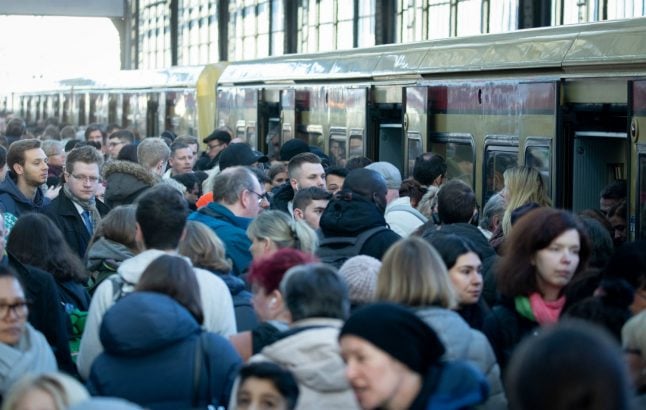Berliner und Touristen kommen heute in der Hauptstadt nur schwer voran. Der Grund ist ein Warnstreik bei den Berliner Verkehrsbetrieben. #BVGStreik pic.twitter.com/VihJss7tbN
— ZDF heute (@ZDFheute) April 1, 2019

Having both the BVG on strike again and one less hour of sleep due to daylight savings time are probably the worst April Fools’ jokes that’s been played on me. pic.twitter.com/gpUyKFd45X
— Joanne Wong (@_jwong) March 31, 2019
Buses and trams remained in depots, while most U-Bahn gates stayed locked, as travellers were forced to find other means of transport to get to work or travel through the city.

.jpg)
Ich glaube einige Autofahrer würden selbiges jetzt auch gerne einfach stehen lassen. #BVGStreik #TXL pic.twitter.com/0wUlDtO5Hl
— Patrick Pickhan (@ppickhan) April 1, 2019
Rollkoffer-Karawane Richtung #Tegel. #TXL #Berlin #Warnstreik #BVG #BVGStreik pic.twitter.com/2vZJoqFLcH
— rbb|24 (@rbb24) April 1, 2019
Sonnige Alternative zu Taxi und Auto während des heutigen BVG Streiks: In 38 Minuten kommt ihr zu Fuß vom S+U Bahnhof #Jungfernheide zum Flughafen #Tegel #TXL. #BVGStreik #BVG ?♂️?♀️✈️https://t.co/g3bD3fvSJ3 pic.twitter.com/PKQkE9mdcC
— Berlin Airport Service (@berlinairport) April 1, 2019
Statt Shuttle-Bus, Taxi oder Auto – mit dem Skateboard kommt man heute vielleicht fast am schnellsten nach #Tegel. #Berlin #TXL #Warnstreik pic.twitter.com/ZNZYQM5C8v
— rbb|24 (@rbb24) April 1, 2019
Lots of people walked to work in the sunshine, got on their bike – or even ran to get some exercise in.
Zum Job pendeln und Sport machen! Hätte mich sonst eine Woche wieder nicht bewegt! Danke @BVG_Kampagne Bestes #Warnstreik Wetter pic.twitter.com/NBeTcj4UZo
— Dr. Iris Marx (@irisma8) April 1, 2019
“Commuting to the job and doing exercise,” said this Twitter user.

Some people took to social media to say they stood with the strikers.
Gerne betroffen vom #Warnstreik bei der @BVG volle Solidarität mit allen Streikenden! ? pic.twitter.com/RoVJgVJT23
— Denis Kaan (@DenisKaan1) April 1, 2019
“Happy to be affected by the BVG strike, full solidarity with the strikers,” said this Twitter user.
BVG employees were out on the picket line in the morning. The dispute is over pay and conditions.


There have been traffic jams in the capital as lots of commuters switched to cars. Berlin transport information network said in some areas there were 45 to 50 minute delays on the road. Drivers were urged to plan more time for their journey.
#STAU-Update zum #Warnstreik bei der #BVG! Auf der #A100 Richtung Wedding +50 Min ab Tempelhofer Damm. Lange Stau mit bis zu +45 Min auch in #Köpenick, #Kreuzberg, #Wedding, #Charlottenburg-Nord und rund um den #Alexanderplatz. Mehr Zeit einplanen! #BVGStreik #BVG #Streik pic.twitter.com/66nUcLYToX
— Verkehrsinformationszentrale Berlin (VIZ) (@VIZ_Berlin) April 1, 2019
Although there were busy S-Bahn trains during rush hour, some people said stations, such as here at Alexanderplatz, were eerily quiet. Perhaps people were avoiding all public transport.
Erstaunlich leer am S-Bahnhof Alexanderplatz #Berlin #streik #Warnstreik #BVGStreik pic.twitter.com/7oi7MFVpWl
— Dominik Bath (@DoBath) April 1, 2019
Union Verdi said the offers from the employeers to the 14,600 staff of the BVG and its subsidiary Berlin Transport (BT) were not good enough.
Das Angebot der #BVG ist unzureichend – Deshalb rufen wir am Montag zum #Warnstreik auf!
Die 14.600 Beschäftigten fordern:
? eine verbesserte Eingruppierung
? eine Absenkung der Arbeitszeit
?? #sonstliebesaushttps://t.co/BMjJ1PN3Pa pic.twitter.com/2TxHEq9VV4— ver.di ✊ (@_verdi) March 29, 2019
The BVG has previously said strike action is “completely inappropriate”.



 Please whitelist us to continue reading.
Please whitelist us to continue reading.
me my motorcycle and open roads